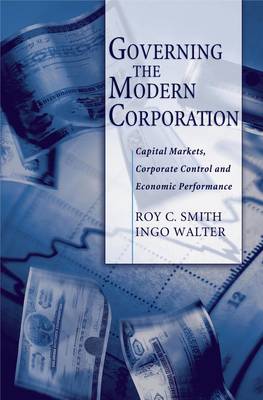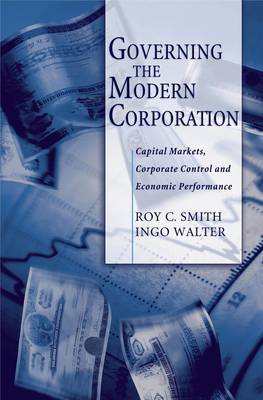
Door een staking bij bpost kan je online bestelling op dit moment iets langer onderweg zijn dan voorzien. Dringend iets nodig? Onze winkels ontvangen jou met open armen!
- Afhalen na 1 uur in een winkel met voorraad
- Gratis thuislevering in België vanaf € 30
- Ruim aanbod met 7 miljoen producten
Door een staking bij bpost kan je online bestelling op dit moment iets langer onderweg zijn dan voorzien. Dringend iets nodig? Onze winkels ontvangen jou met open armen!
- Afhalen na 1 uur in een winkel met voorraad
- Gratis thuislevering in België vanaf € 30
- Ruim aanbod met 7 miljoen producten
Zoeken
Governing the Modern Corporation
Capital Markets, Corporate Control, and Economic Performance
Roy C Smith, Ingo Walter
Hardcover | Engels
€ 103,95
+ 207 punten
Omschrijving
Nearly seventy years after the last great stock market bubble and crash, another bubble emerged and burst, despite a thick layer of regulation designed since the 1930s to prevent such things. This time the bubble was enormous, reflecting nearly twenty years of double-digit stock market growth, and its bursting had painful consequence. The search for culprits soon began, and many were discovered, including not only a number of overreaching corporations, but also their auditors, investment bankers, lawyers and indeed, their investors. In Governing the Modern Corporation, Smith and Walter analyze the structure of market capitalism to see what went wrong.
They begin by examining the developments that have made modern financial markets--now capitalized globally at about $70 trillion--so enormous, so volatile and such a source of wealth (and temptation) for all players. Then they report on the evolving role and function of the business corporation, the duties of its officers and directors and the power of its Chief Executive Officer who seeks to manage the company to achieve as favorable a stock price as possible.
They next turn to the investing market itself, which comprises mainly financial institutions that own about two-thirds of all American stocks and trade about 90% of these stocks. These investors are well informed, highly trained professionals capable of making intelligent investment decisions on behalf of their clients, yet the best and brightest ultimately succumbed to the bubble and failed to carry out an appropriate governance role.
In what follows, the roles and business practices of the principal financial intermediaries--notably auditors and bankers--are examined in detail. All, corporations, investors and intermediaries, are found to have been infected by deep-seated conflicts of interest, which add significant agency costs to the free-market system. The imperfect, politicized role of the regulators is also explored, with disappointing results. The entire system is seen to have been compromised by a variety of bacteria that crept in, little by little, over the years and were virtually invisible during the bubble years.
These issues are now being addressed, in part by new regulation, in part by prosecutions and class action lawsuits, and in part by market forces responding to revelations of misconduct. But the authors note that all of the market's professional players--executives, investors, experts and intermediaries themselves--carry fiduciary obligations to the shareholders, clients, and investors whom they represent. More has to be done to find ways for these fiduciaries to be held accountable for the correct discharge of their duties.
They begin by examining the developments that have made modern financial markets--now capitalized globally at about $70 trillion--so enormous, so volatile and such a source of wealth (and temptation) for all players. Then they report on the evolving role and function of the business corporation, the duties of its officers and directors and the power of its Chief Executive Officer who seeks to manage the company to achieve as favorable a stock price as possible.
They next turn to the investing market itself, which comprises mainly financial institutions that own about two-thirds of all American stocks and trade about 90% of these stocks. These investors are well informed, highly trained professionals capable of making intelligent investment decisions on behalf of their clients, yet the best and brightest ultimately succumbed to the bubble and failed to carry out an appropriate governance role.
In what follows, the roles and business practices of the principal financial intermediaries--notably auditors and bankers--are examined in detail. All, corporations, investors and intermediaries, are found to have been infected by deep-seated conflicts of interest, which add significant agency costs to the free-market system. The imperfect, politicized role of the regulators is also explored, with disappointing results. The entire system is seen to have been compromised by a variety of bacteria that crept in, little by little, over the years and were virtually invisible during the bubble years.
These issues are now being addressed, in part by new regulation, in part by prosecutions and class action lawsuits, and in part by market forces responding to revelations of misconduct. But the authors note that all of the market's professional players--executives, investors, experts and intermediaries themselves--carry fiduciary obligations to the shareholders, clients, and investors whom they represent. More has to be done to find ways for these fiduciaries to be held accountable for the correct discharge of their duties.
Specificaties
Betrokkenen
- Auteur(s):
- Uitgeverij:
Inhoud
- Aantal bladzijden:
- 336
- Taal:
- Engels
Eigenschappen
- Productcode (EAN):
- 9780195171679
- Verschijningsdatum:
- 12/01/2006
- Uitvoering:
- Hardcover
- Formaat:
- Genaaid
- Afmetingen:
- 236 mm x 160 mm
- Gewicht:
- 601 g

Alleen bij Standaard Boekhandel
+ 207 punten op je klantenkaart van Standaard Boekhandel
Beoordelingen
We publiceren alleen reviews die voldoen aan de voorwaarden voor reviews. Bekijk onze voorwaarden voor reviews.











